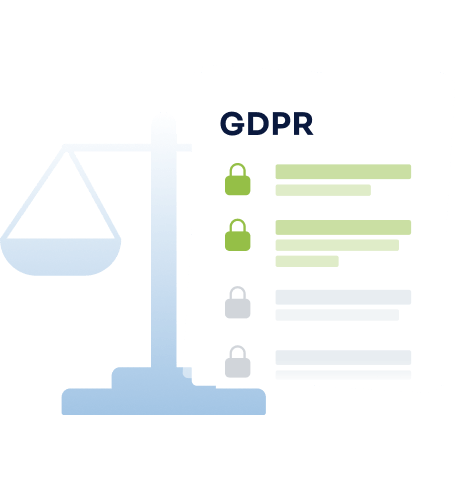Introduction
The General Data Protection Regulation (GDPR) introduced new rules on the processing of personal data. One of the lawful bases for processing personal data is a legitimate interest. Legitimate interest means that there is a legitimate reason for processing personal data, and it is necessary for a specific purpose. This article will explain what legitimate interest means under the GDPR and how it can be used as a lawful basis for processing personal data.
GDPR legitimate interest
The GDPR allows the processing of personal data on the basis of legitimate interest. Legitimate interest can be used when a data controller has a legitimate reason for processing personal data and is necessary for a specific purpose. However, using legitimate interest as a lawful basis for processing personal data requires that the data controller balances their interests against the interests of the data subject.
The purpose test
The purpose test is the first step in assessing whether legitimate interest can be used as a lawful basis for processing personal data. The purpose test requires the data controller to identify a legitimate interest pursued by the data controller or a third party to collect personal data. The data controller must also show that the processing is necessary to achieve that legitimate interest.
Declaring legitimate interests under GDPR
Under the GDPR, data controllers must declare their legitimate interests when processing personal data. This means that data controllers must explain to the data subject why their personal data is being processed and what legitimate interest is being pursued.
The necessity test
The necessity test is the second step in assessing whether legitimate interest can be used as a lawful basis for processing personal data. The necessity test requires the data controller to show that the processing of personal data is necessary for achieving the legitimate interest identified in the purpose test.
Do cookies fall under legitimate interest?
Cookies are small text files stored on a user’s device when they visit a website. Cookies can be used for various purposes, such as remembering user preferences, tracking user behavior, and delivering targeted advertising. Using cookies to process personal data may fall under legitimate interests if necessary for the legitimate interests pursued by the business.

How to demonstrate a legitimate interest
To demonstrate data protection authorities’ legitimate interest, businesses must conduct a legitimate interest assessment (LIA) to ensure that the interests of data subjects are not overridden by the interests of the business. The LIA should include the following key elements:
Identify the legitimate interests pursued by the business.
Determine whether the processing is necessary for the legitimate interests pursued by the business.
Balance the interests of the business against the interests, rights, and freedoms of the data subjects.
Document the legitimate interest assessment.
The balancing test
The balancing test is an essential component of the LIA. It involves weighing the business’s legitimate interests against the interests, rights, and freedoms of the data subjects. The following factors should be considered when conducting the balancing test:
The nature and scope of the personal data processed.
The impact of the processing on the data subjects.
The safeguards and measures are in place to protect personal data.
The reasonable expectations of the data subjects.
Any safeguards, measures, or controls that could be implemented to mitigate the risks to the data subjects.
What does Article 6(1)(f) state about legitimate interests?
Article 6(1)(f) of the GDPR states that the processing of personal data is lawful if it is necessary for the legitimate interests pursued by the data controller or a third party, except where the interests, rights, or freedoms of the data subject override such interests.
Examples of legitimate interest
There are many situations in which businesses can rely on legitimate interests as the lawful basis for processing personal data. Here are some examples:
Fraud detection and prevention: Processing data to detect and prevent fraudulent online transactions is a legitimate interest for e-commerce businesses.
Customer service: A company may process the personal data of its customers to provide customer services, such as answering inquiries or resolving issues related to products or services.
Network and information security: Processing personal data to ensure the security and integrity of a network and prevent unauthorized access is a legitimate interest for businesses.
Direct marketing: Processing personal data for direct marketing purposes can be a legitimate interest, but it requires careful assessment to ensure that the interests of the business do not override the interests of data subjects.
Employee management: Processing employees’ personal data is necessary for managing the employment relationship, such as payroll and benefits administration, performance evaluations, and disciplinary actions.
Client management: Processing the personal data of clients is necessary for managing the client relationship, such as billing and invoicing, providing services or products, and communicating with clients.
GDPR consent vs. legitimate interest
While consent is one of the lawful bases for processing personal data under the GDPR, it is not always necessary. Legitimate interest can be used as an alternative, legal basis for processing personal data, mainly where the processing is required for a specific purpose.
Can individual rights override legitimate interests?
Individual rights under the GDPR, such as the right to erasure, can override legitimate interests to process data further. In these cases, businesses must carefully consider whether the processing of personal data is necessary and proportionate to the interests pursued by the company.

Is legitimate interests the most appropriate basis for data processing activities?
The use of legitimate interest as the basis for data processing activities will depend on the specific circumstances of each case. Businesses must carefully consider whether legitimate interest applies and is the most appropriate basis for their data processing activities, taking into account the interests of data subjects and any legal obligations that apply.
Will the data be processed in a way that meets users’ reasonable expectations?
When processing personal data, businesses must ensure that they are meeting the reasonable expectations of their users. This means that the user’s personal data and processing activities should be carried out in a way that is consistent with the users’ expectations.
For example, if a user signs up for a newsletter, they would reasonably expect to receive emails related to the newsletter’s content from the business. However, if the business starts sending unrelated marketing emails to users without their consent, this would not meet the user’s reasonable expectations.
To ensure that data processing activities meet users’ reasonable expectations, businesses must be transparent about their data collection practices and clearly state what the data will be used for. This information should be provided in a clear and concise privacy policy that is easily accessible to users.
Additionally, businesses should provide users with the ability to exercise their data protection rights, such as the right to access and delete their personal data. Businesses can build trust and demonstrate their commitment to protecting user privacy by giving users control over their data.
When to avoid legitimate interest as a lawful basis
While legitimate interest can be a useful basis for data processing activities, it is essential to note that there are situations where relying on this basis may not be appropriate. In particular, there are cases where the data subject’s fundamental rights and freedoms may be at risk, and it is, therefore, necessary to rely on a different basis.
One situation where such legitimate interest only may not be appropriate is when data processing involves sensitive personal data. This includes data about a person’s race, ethnicity, religion, political opinions, health, sexuality, or criminal history. In these cases, obtaining the data subject’s explicit consent is generally recommended before processing the data.
Another situation where legitimate interest may not be appropriate is where the data processing is likely to have a significant impact on the data subject. This could include processing for profiling, automated decision-making, or any other form of processing that involves a considerable degree of risk. In these cases, it is vital to obtain the data subject’s explicit consent or to rely on another lawful basis.

Employee monitoring
Employers have a legitimate interest in monitoring their employees to ensure productivity, protect company assets, and prevent misconduct. However, this monitoring must be carried out under the principles of GDPR and the relevant national legislation.
Employers must provide clear information to their employees about the nature and extent of any monitoring that takes place. This should include details of the data that is collected, the purpose of the monitoring, and how the data will be used. Employees must also be informed of their rights under GDPR, including their right to access their personal data and object to processing.
Employers must ensure that any monitoring is necessary and proportionate to the legitimate interests pursued. This means that they must carefully consider the extent of the monitoring and whether it is needed to achieve their objectives. For example, monitoring email and internet usage may be necessary to protect company assets, but monitoring employee conversations may not be necessary.
Employers must also ensure that any monitoring is carried out in a way that respects the privacy and dignity of their employees. This means that monitoring should be carried out in a non-intrusive way and that any data collected should be used only for the specific purpose for which it was collected.
Conclusion
Legitimate interest can be a lawful basis for data processing under the GDPR, but it must be carefully considered and assessed. Businesses must ensure that they have a legitimate interest in processing personal data and that this legitimate interest applies and is not outweighed by the data subject’s interests or fundamental rights and freedoms.
When relying on legitimate interest as a lawful basis for data processing, businesses must conduct a legitimate interest assessment (LIA) and demonstrate that the processing is necessary and proportionate. The processing activities must also meet users’ reasonable expectations and not cause them any social or economic disadvantage.
In some cases, relying on another lawful basis for data processing may be more appropriate, such as consent or a legal obligation. Businesses should consider whether legitimate interest is the most appropriate basis for their data processing activities on a case-by-case basis.
Overall, businesses must ensure that they are processing personal data in a lawful, fair, and transparent way. By doing so, they can build trust with their users and ensure they comply with the GDPR and other data protection regulations.




